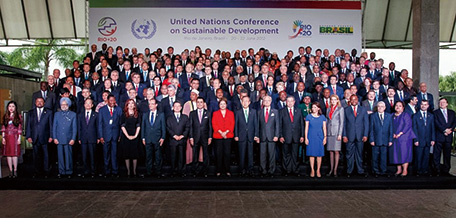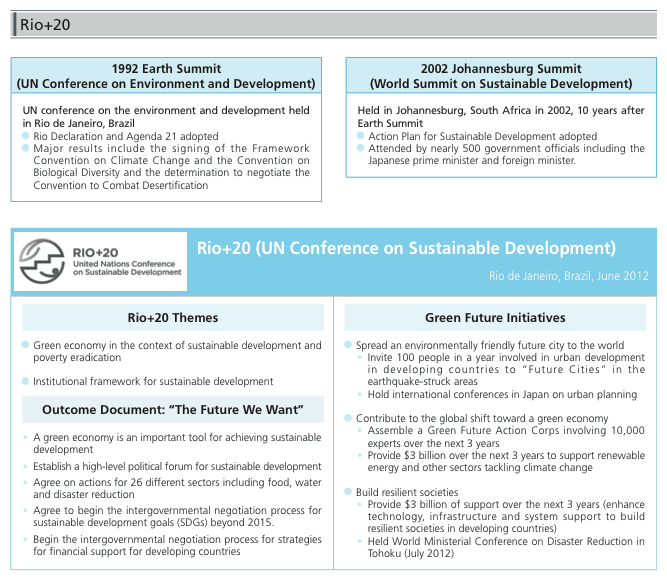Japan's Official Development Assistance White Paper 2012
ODA Topics
Rio+20 and Sustainable Development
The United Nations Conference on Sustainable Development (Rio+20) was held in Rio de Janeiro, Brazil in June 2012, 20 years after the United Nations Conference on Environment and Development (Earth Summit), in 1992. World leaders gathered at Rio+20 to partake in new discussions on the environment, poverty, disasters and other topics.

97 world leaders from 188 countries attended Rio+20.
1. Sustainable Development
Sustainable development is defined as development that meets the needs of the present without compromising the ability of future generation to meet their own need. This concept was a central theme of "Our Common Future," a report published in 1987 by the World Commission on Environment and Development. Sustainable development is based on the idea that the environment and development can coexist rather than oppose each other and emphasizes environmentally-sound development.
At the Earth Summit held in Rio de Janeiro, Brazil in 1992, the Rio Declaration on Environment and Development and Agenda 21, an action plan to fulfill the Rio Declaration, were adopted. Furthermore, the Framework Convention on Climate Change and the Convention on Biological Diversity were signed there. Thus, the Summit had a significant effect on the way of thinking about sustainable development and protecting the global environment. A decade later, the Johannesburg Plan of Implementation was adopted at the World Summit on Sustainable Development in Johannesburg, South Africa (Johannesburg Summit). Since then, concentrated efforts have been made in fields such as energy, agriculture, and water and sanitation. That said, 20 years have passed since Earth Summit, and the circumstances surrounding our global society have changed drastically. Resources are becoming depleted and major natural disasters occur more frequently. Also, developing countries, the private sector, NGOs and other main players on the global stage are diversifying and need to play roles that fit their respective capabilities.
2. UN Conference on Sustainable Development (Rio+20)
Rio+20 was held in Rio de Janeiro in June 2012, approaching the 20th year since Earth Summit. 97 world leaders as well as nearly 30,000 people such as ministers and members of international organizations, private companies and civil societies from around the world participated and discussed green economy* in the context of sustainable development and poverty eradication and institutional framework for sustainable development. An outcome document titled "The Future We Want" was adopted at the conference, and it was agreed to: (i) acknowledge that a green economy is an important tool for achieving sustainable development and therefore is to be recognized as a common undertaking among countries which pursue sustainable development; (ii) establish a high level political forum on sustainable development; (iii) agree on 26 thematic areas including sustainable cities, disaster risk reduction, etc.; (iv) establish intergovernmental negotiation processes on sustainable development goals (SDGs)*; and (v) prepare a report on sustainable development financing strategy by 2014.
The Japan Pavilion at Rio+20 showcased Japan's advanced environment and energy-saving technology while demonstrating reconstruction efforts after the Great East Japan Earthquake. Japan also held an official side event on "Future City". (Note 1)
3. Green Future Initiative
At Rio+20, Japan presented the "Green Future" Initiatives built on three concepts: (i) spreading environmentally friendly future city to the world; (ii) contributing to the global shift towards a green economy; and (iii) building resilient societies.
Under these Initiatives, Japan will use its advanced environmental and low-carbon technologies, knowledge and experience to proactively contribute to the global transition to a green economy. Towards that end, Japan will form a Green Future Action Corps involving about 10,000 experts over the next three years to support human resources development in developing countries. Japan will also provide $3 billion over the next three years to help developing countries with their shifts toward green economy.
The Great East Japan Earthquake was a major disaster for Japan. Over the next three years, Japan will use the experience it has gained from the reconstruction process and provide $3 billion to sectors involved in disaster reduction in developing countries to help them build resilient societies that can persevere in the face of natural disasters.
Roughly half of the world's population currently lives in urban areas and the urban population will likely increase in the future. It is necessary to build sustainable cities with environmental technology, core infrastructure and resilience. Each year, Japan will invite 100 urban planners from developing countries to share its experience in reconstructing disaster-stricken areas simultaneously. Japan will also hold an international conference in the future to enhance its network of international cooperation to determine the best ways to develop cities. Through these specific efforts, Japan continues to contribute to sustainable development.

- *Green Economy
- An economic system which promotes sustainable growth while improving human welfare, by pursuing economic growth and the environmental conservation in tandem. Green Economy was recognized at Rio+20 as important toward achieving sustainable development.
- *Sustainable Development Goals (SDGs)
- Development goals discussed at Rio+20. Participants agreed to begin the intergovernmental negotiation process to meet SDGs. SDGs apply to all countries but take into account the capabilities of each. They are supposed to be incorporated into the post-2015 UN development agenda. Specific fields have not yet been named, but details will be discussed in the near future.
Note 1: Relevant exhibits and seminars put on by governments, international organizations, local governments and NGOs in nearby conference halls during Rio+20.
